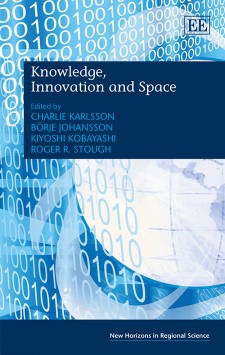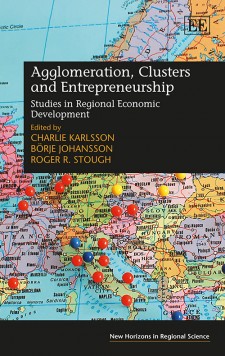Obituaries
Elisabete Martins
Books - 2014
Handbook of Regional Science
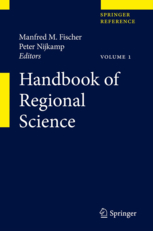
Editors: Fischer, Manfred M., Nijkamp, Peter (Eds.)
The Handbook of Regional Science is a multi-volume reference work providing a state-of-the-art knowledge on regional science composed by renowned scientists in the field. The Handbook is intended to serve the academic needs of graduate students, and junior and senior scientists in regional science and related fields, with an interest in studying local and regional socio-economic issues. The multi-volume handbook seeks to cover the field of regional science comprehensively, including areas such as regional housing and labor markets, regional economic growth, innovation and regional economic development, new and evolutionary economic geography, location and interaction, the environment and natural resources, spatial analysis and geo-computation as well as spatial statistics and econometrics.
Knowledge, Innovation and Space
Edited by Charlie Karlsson, Börje Johansson, Kiyoshi Kobayashi and Roger R. Stough
The contributions in this volume extend our understanding about the different ways distance impacts the knowledge conversion process. Knowledge itself is a raw input into the innovation process which can then transform it into an economically useful output such as prototypes, patents, licences and new companies. New knowledge is often tacit and thus tends to be highly localized, as indeed is the conversion process. Consequently, as the book demonstrates, space or distance matter significantly in the transformation of raw knowledge into beneficial knowledge.
Agglomeration, Clusters and Entrepreneurship
Studies in Regional Economic Development
Regional economic development has experienced considerable dynamism over recent years. Perhaps the most notable cases were the rise of China and India to emergent country status by the turn of the millennium. With time now for hindsight, this book identifies some of the key forces behind these development successes, namely agglomeration, clusters and entrepreneurship.
Regional Development and Proximity Relations
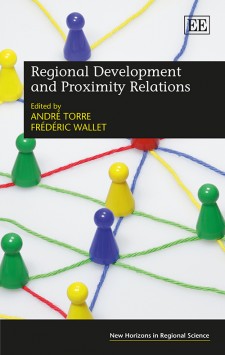
Edited by André Torre and Frédéric Wallet
Technology and Industrial Parks in Emerging Countries
Panacea or Pipedream?
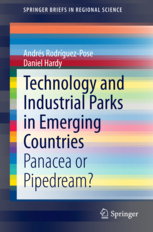
Authors: Rodriguez-Pose, Andres, Hardy, Dan
Industrial and technology parks are commonly regarded as a policy panacea. They tend to be considered as the ideal instrument to alleviate an assortment of institutional, political, economic, social and ultimately, technological weaknesses and often form the centrepiece of development strategies. Yet, the real impact of industrial and technology parks, especially in emerging countries is still poorly understood. Focusing on examples from Latin America, Asia, Africa and the Middle East, the book represents a first approach to understand the potential and reality of industrial and technology parks in emerging countries. It is argued that although some parks have been successful in addressing a range of key problems, including underdevelopment, unemployment and a lack of investment, the majority have failed to deliver, rendering the promise of many parks little more than a pipedream.
Spatial Econometrics
From Cross-Sectional Data to Spatial Panels
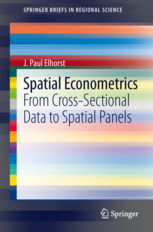
Authors: Elhorst, J Paul
This book provides an overview of three generations of spatial econometric models: models based on cross-sectional data, static models based on spatial panels and dynamic spatial panel data models. The book not only presents different model specifications and their corresponding estimators, but also critically discusses the purposes for which these models can be used and how their results should be interpreted.
Applied Regional Growth and Innovation Models
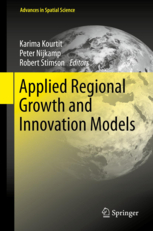
Editors: Kourtit, Karima, Nijkamp, Peter, Stimson, Robert (Eds.)
Modern spatial-economic systems exhibit a high degree of dynamics as a result of technological progress, demographic evolution or global change. In the past decade, an avalanche of new regional economic growth and innovation models has been put forward. This volume contains a unique collection of operational models of a strong applied nature that may be seen as original landmarks in the rich tradition of spatial-economic growth modelling. The contributors are recognized experts from different parts of the world.
South Africa Urban and Regional Science conference, July 3-5, 2017 Stellenbosch University, South Africa
CRUISE-Statistics South Africa Urban and Regional Science Conference 2017
Date
July 3-5, 2017
Location
STIAS, Stellenbosch University, South Africa.
Organization
The 3rd Biannual ISIbalo CRUISE Urban and Regional Science Conference is jointly organised by the Centre for Regional and Urban Innovation and Statistical Exploration (CRUISE) and Statistics South Africa in conjunction with the Regional Science Association International.
Aim
The conference is aimed at bringing researchers from academia, the private and public sectors and non-governmental organisations together in an effort to present and debate prevalent urban and regional evelopment issues and to share knowledge, viewpoints, methods and research outcomes around six main themes:
Theme 1 – Social, economic and structural change in cities and regions
Theme 2 – Clusters / corridors / declining / lagging areas
Theme 3 – Formal / informal business growth / decline
Theme 4 – Mobility / migration / commuting trends and issues
Theme 5 – Urban growth / housing trends and issues
Theme 6 – Governance / policy issues
Researchers in the fields of Economics, Planning, Geography, Sociology and related Social Sciences are encouraged to participate.
CONFERENCE PARTICIPATION
Participation in the conference requires an oral presentation of 20 minutes. The conference is organized in panels of 4 papers each. Presentations are selected on content and appropriateness to the conference themes.
ABSTRACTS
• Interested researchers should submit an abstract of around 250 words by e-mail not later than February 24, 2017, to: This email address is being protected from spambots. You need JavaScript enabled to view it.
• Enquiries: Arul Naidoo, E-mail: This email address is being protected from spambots. You need JavaScript enabled to view it.
• Successful participants will be informed by March 31, 2017.
PUBLICATION
Opportunities will be given for publication of collections of approved papers for publication in journals after the conference (publication plan to be announced during the conference).
NETWORKING
The conference is an opportunity for researchers to meet and to discuss future joint research initiatives and opportunities.
REGISTRATION
• Conference fee:
Non-RSAI members: Early Bird registration180 Euros before April 15; 250 Euros after April 15.
RSAI members: Early Bird registration 150 Euros before April 15; 200 Euros after April 15.
Participants from Africa: Early Bird registration RZA 1000 before April 15; RZA 1500 after April 15.
• Conference fee includes participation in the conference, programme and abstracts in digital format, Wi fi, secured parking, coffee-breaks and lunch.
• Downloadable registration forms: http://www.statssa.gov.za/?page_id=9282
IMPORTANT DATES
• Submission deadline for abstracts: February 24, 2017.
• Notification of abstract acceptance: March 31, 2017.
• Early bird registration and payment: 1 - 15 April 2017.
• PowerPoint Presentation.
• Full paper for publication: date to be announced during the conference.
CONFERENCE CONVENOR & ORGANIZATION
Manie Geyer
Centre for Urban and Regional Innovation and Statistical Exploration
Stellenbosch University
Stellenbosch, South Africa
Arul Naidoo
Statistics South Africa
Pretoria, South Africa
CONFERENCE VENUE
STIAS Centre
Stellenbosch University
Stellenbosch, South Africa
CONFERENCE E-MAIL & WEBSITE
Conference e-mail: This email address is being protected from spambots. You need JavaScript enabled to view it.
Conference website: http://www.statssa.gov.za/?page_id=9282
ACCOMMODATION
http://www.booking.com/city/za/stellenbosch.html
http://www.stellenbosch.travel/stay-us
PROVISIONAL PROGRAMME
July 3, 2017 Monday
08:00 to 09:00 Conference registration
09:00 to 09:15 Welcome and Housekeeping
09:15 to 09:45 Address: Minister
09:45 to 10:30 Address: Member of University Executive
10:30 to 11:00 Keynote Address
11:40 to 17:20 Presentations
July 4, 2017 Tuesday
09:00 to 16:00 Presentations
July 5, 2017 Wednesday
09:00 to 14:40 Presentations
14:40 to 15:30 Publication Strategy Meeting
See attachment.
The 2017 Paul Polzin Prize for Best Paper
The Association for University Business and Economic Research (AUBER) is once again reaching out to regional scientists who would like take the next step and learn the nuts and bolts of operating a university research center. AUBER has established the Polzin Prize of $500 for the best paper presented at its fall conference October 21-24, 2017, in Albuquerque. Paul Polzin was the 30th President of WRSA in 1990 and was active in the SRSA in the mid-to-late 1990s. For more information about AUBER go to www.auber.org.
The 2016 winner of the Polzin Prize was Prof. Carl Bonham of the University of Hawaii. His paper it titled “Forecasting in a Mixed-Up World: Nowcasting Hawaii Tourism.”
Eligibility: To be considered for the Polzin Prize:
- The paper’s lead author must be an individual AUBER member at the time of the Fall Conference or be employed at an AUBER member unit whose membership is in good standing; (Fall Conference registration fees include a one-year membership for non-AUBER members who submit papers for consideration)
- The paper must be presented on a panel at the Fall Conference;
- The paper should be prepared in academic format (APA or other commonly accepted scholarly style);
- Because the purpose is to encourage new work, submissions should not have been previously published or accepted for publication.
Process: Each eligible paper will be read by all members of an evaluation committee (the three most-recent AUBER Past Presidents) and evaluated against the criteria below. Committee members must decline to judge papers if they have the following special relationships with the author(s) of the papers submitted: relatives, students, colleagues, or co-authors. The winner will receive a $500 cash award during the Fall Conference Awards breakfast.
Submission Deadline: September 1, 2017
Submit one copy of your paper by email as a PDF attachment, without identifying author information, to Kathy Deck (This email address is being protected from spambots. You need JavaScript enabled to view it.) by the deadline. The winning paper will be announced at the AUBER Fall Conference.
57th ERSA Congress: Apply for the Call for Papers Now – Deadline 10th February 2017
Call for Submissions NOW OPEN
The Local Organizing Committee of ERSA2017 invite you to submit your contributions to ERSA2017 in Groningen! We look forward to receiving your submissions before February 10th 2017 . Should you have any questions, please contact the Local Organizing Committee at This email address is being protected from spambots. You need JavaScript enabled to view it.
Congress themes
The congress theme is ‘Social progress for resilient regions’, but the congress covers all fields in Regional Science. In addition to the general themes, a limited set of Special Sessions will be organized. The Special Sessions address specific and topical themes in Regional Science. Please, refer to the Submission guidelines 2017 for the procedures and important dates for each session type.
Special Sessions (S)
S01. Regional Resilience in the face of Natural Disasters and Climate Change (in association with the Waddenacademie)
Alessandra Faggian, Luciana Lazzeretti, Silvia Rita Sedita, Jouke van Dijk
S02. Urban Disasters and Resilience Policies of Cities
Kamila Borsekova, Peter Nijkamp
S03. The Impact of Earthquakes on Regional Housing Markets and Regional Economic Development
Roderik Ponds, Harry Garretsen, Gerard Marlet
S04. Rural Challenges and Quality of Life in Times of Change
Suzan Christiaanse, Tialda Haartsen
S05. Smart Rural Development and Beyond
André Torre, Fred Wallet
S06. New Smart Manufacturing Models for Resilient Regions
Lisa de Propris, Marco Bellandi
S07. Regional and Urban Perspectives on Individual Well-Being
Camilla Lenzi, Philip S. Morrison, Giovanni Perucca, Paolo Veneri
S08. Happy Communities: Effects of Social Interaction
Aleid Brouwer, Eveline van Leeuwen, Heike Delfmann
S09. Tourism for Resilient Regions (in association with the Waddenacademie)
Jouke van Dijk, Stefan Hartman
S10. Modern Approaches to Labor Market Polarization
Raquel Ortega-Argilés, Steven Brakman, Terzides Nikolaos
S11. Determinants of Unemployment in Regions
Stephan Brunow
S12. Real Estate and Housing (in association with ERES)
Paloma Taltavull, Gunther Maier, Arno van der Vlist
S13. Measuring Agglomeration Advantages using Innovative Geo-Data
Joachim Möller
S14. Are Cities more Productive but less Inclusive? (in association with European Commission)
Lewis Dijkstra, Laura de Dominicis
S15. Problems and Prospects of Slowly Growing Medium-sized Cities
Rüdiger Hamm, Martin Rosenfeld, Artur Ochojski, Alina Schoenberg, Ondřej Slach
S16. What is the Place of Retail in Contemporary Cities?
Krystian Heffner, Małgorzata Twardzik
S17. W on the Focus
Jesus Mur, Ana Angulo
S18. Mapping Urban Networks
Gudrun Haindlmaier
S19. Foreign Investment, Multinationals and Regional Development
Riccardo Crescenzi, Nicola Cortinovis, Frank van Oort
S20. Cross-Border Cooperation as a key Factor of Resilience (in association with the European Commission)
Nathalie Verschelde, Lewis Dijkstra, Jean Peyrony
S21. Walled Territories
Andrea Székely, Thomaz Dentinho
S22. Spatial Demography in Regional Science
Rachel Franklin, Jacques Poot
S23. Counterfactual Methods for Regional Policy Evaluation
Elena Ragazzi, Marco Mariani, Lisa Sella
S24. The EU Cohesion Policy after the Crisis and Brexit
Riccardo Crescenzi, Ugo Fratesi, Vassilis Monastiriotis
S25. More than Planning: Land Use and its Policies in the OECD (in association with the OECD)
Abel Schumann
S26. Issues in Urban Policy
Johan Lundberg
S27. Place-based Policies and International Embeddedness
Dirk Dohse, Dirk Fornahl, Robert Gold
S28. Territorial Policy Impact Assessments in CGE Models
Martin Aarøe Christensen, Francesco di Comite
S29. Spatial CGE Modeling and Transport Issues
Tomoki Ishikura, Atsushi Koike
S30. Trade and Entrepreneurship for Growth in all Regions (in association with the OECD)
Alexander Lembcke, Paolo Veneri
S31. The Social Dimension of Entrepreneurship in the Context of Economic Crisis
Veronique Schutjens, Darja Reuschke
S32. National and International Locational Preferences of Firms
Dario Musolino, Ilaria Mariotti
S33. Urban Economics: Markets, Real Estate and Planning
Philip McCann, Jouke van Dijk, Arno van der Vlist
S34. A new Industrial and Regional Policy for European Growth and Integration (by invitation only)
Riccardo Cappellin, Enrico Ciciotti
General Themes (G)
G01. Social Progress for Resilient Regions (Resilience, Well-being, Inequality, Segregation, Poverty)
G02. Regional Economic Development
G03. Regional or Urban Labour Markets
G04. Migration, Commuting or Mobility
G05. Infrastructure, Transportation or Accessibility
G06. Innovation and Entrepreneurship
G07. Benefits of Agglomeration
G08. Education
G09. Tourism
G10. Transitional economies
G11. International Trade and FDI
G12. Regional or Urban Policy, Governance
G13. Institutions
G14. Real Estate and Housing
G15. Regional Finance, Investment or Capital Markets
G16. Convergence/Divergence
G17. Rural Issues
G18. Environmental Issues or Sustainable Development
G19. Location of Economic Activity
G20. Methods in Regional Science or Urban Economics
Session Types
ERSA2017 offers four session types you can submit to: Refereed Sessions, Special Sessions, Young Scientists/Epainos Sessions and Ordinary Sessions (R-Sessions, SS, YSS and O-Sessions).
In R-Sessions, SS and YSS you will receive ample presentation time (~30 minute slots) and your contribution will be assigned a discussant. Initial submission to these sessions is on the basis of an extended abstract or a draft paper (before Feb 10th). Each contributor must have uploaded a full (draft) paper before June 9th 2017.
O-Sessions allow for presentation times of 15-20 minutes and feedback is provided by the audience present. Submission to O-sessions is on the basis of an abstract.
CALL FOR PAPERS_INTERNATIONAL CONGRESS ON HIGH-SPEED RAIL_SPAIN 2017
Dear colleague,
We are pleased to announce the International Congress on High-speed Rail: Technologies and Long Term Impacts to be held at the University of Castilla La Mancha (Spain) on October 4th-6th, 2017.
Considering that High-speed Rail has been in operation for more than half a century in Japan and thirty-five years in Europe, this Congress aims to discuss and debate the long-term Technological, Socio-economic and Transport/Territorial impacts of High-speed Rail and to develop a better understanding of the planning criteria for the future.
As you can see in the attached Call for Papers, contributions are welcome on a wide range of topics and participants are encouraged to take part in this event by sending an abstract before April 5th, 2017. Due to the relevance of the topic, our aim is to contribute with the publication of different Special Issues in high-quality journals gathering some of the papers presented at the Congress (authors interested in this possibility should consider the requirements established in the Congress Website).
For more details, please check the Congress web page:
Finally, we would be really grateful if you could distribute this Call for Papers among those of your colleagues that may be interested on the Congress topics.
We are looking forward to seeing you next October in Spain.
Kind regards,
Inmaculada Mohíno
PhD in Territory, Infrastructures and Environment
City and Regional Planning Research Group
University of Castilla-La Mancha
Avda. Camilo José Cela s/n – 13071 Ciudad Real (Spain)
This email address is being protected from spambots. You need JavaScript enabled to view it.
Cell: (+34) 626.24.55.46
21st Air Transport Research Society World Conference - Call For Abstracts
|
|||
|
|||
|
Call for Papers for a special issue of The Review of Regional Studies
Call for Papers for a special issue of The Review of Regional Studies
This special issue seeks to explore the relationship between the use of targeted tax exemptions or breaks and other forms of incentives to attract and retain businesses and ensure a prosperous local economy. Targeted incentives refer to exemptions in taxes provided to selected firms as opposed to across the board tax cuts. The special issue seeks to address broad themes like, Do targeted incentives contribute to or reduce economic freedom? Can targeted incentives generate a prosperous regional economy? Are targeted incentive deals an example of cronyism?
The special issue is receptive to papers pursuing these themes using a variety of methods, including literature reviews, meta-analyses, and case studies, in addition to theory and empirics, as well as papers addressing a variety of specific topics related to the broad themes.
Papers for the special issue could address topics including: A review of economists’ analysis and opinions regarding economic development over time; the diffusion of incentive programs across jurisdictions; whether government revenue lost due to incentives leads to increases in tax rates; whether incentive deals approximate incentive-compatible contracts between local governments and businesses; are political connections indispensable to receive targeted incentive deals; whether mobility and interjurisdictional competition increases the ability of less politically connected firms to incentives; whether economic freedom and prosperity is increasing or decreasing in regional economies or states that have most aggressively pursued targeted incentives for business, and whether the welfare effects of targeted tax breaks differ from financial assistance to firms.
Papers must be submitted by May 1, 2017, with the special issue to be published in late 2017.
If you would like to discuss a topic for the special issue prior to submitting an abstract, please contact the editor of the special issue directly (This email address is being protected from spambots. You need JavaScript enabled to view it.).
To prepare papers for submission to the special issue, sessions will be organized at the Southern Regional Science Association (SRSA) meetings in Memphis, March 30-April 1, 2017. The Mercatus Center and Institute for Humane Studies have travel awards available to enable authors from selected papers to attend the meetings and present their papers for feedback prior to submission for the special issue. Papers can be submitted for the special issue without being presented at the SRSA conference, and papers selected for the sessions are not assured of acceptance in the special issue.
Sessions Information
The Mercatus Center at George Mason University, the Institute for Humane Studies, and the Manuel H. Johnson Center for Political Economy at Troy University will organize sessions at the 2017 Southern Regional Science Association meetings in Memphis, March 30 – April 1, to help prepare papers for submission to a special issue of The Review of Regional Studies on the general subject of “Targeted Economic Development Incentives, Economic Freedom, and Prosperity.” The call for papers for the special issue can be viewed here. Two sessions will be organized at the SRSA meetings. Travel support for one author of papers selected for the sessions will be available from the sponsoring organizations, and there will also be a dinner and reception for the contributors to the sessions during the conference.
To be considered for the sessions, authors should submit an abstract of not more than 300 words detailing the topic, methods, and expected contribution of their paper by January 10, 2017 to Scott Eastman (This email address is being protected from spambots. You need JavaScript enabled to view it.). Authors of papers selected for the sessions will be notified by January 20, 2017, and a completed draft of papers for the conference will be due by March 1, 2017. In addition to consideration for the special issue of The Review of Regional Studies, papers will be additionally considered for publication as Mercatus Working Papers.
Please share with others who might be interested.
Call For Papers Southern Regional Science Association Annual Conference
Call for Papers - 2017 SRSA Meeting -- Memphis, TN
Join us for the 56th Annual Meeting of the
Southern Regional Science Association
Memphis, TN
@ the Marriott Memphis East
March 30 - April 1, 2017
Please visit the conference website to submit an abstract, register, and reserve your hotel room - https://www.srsa.org/conferencesub.htm/
2017 SRSA Conference Website
Please spread the word, share this with others who might wish to attend!
Southern Regional Science Association
________________________________________
UNDERGRADUATE POSTER SESSIONS
________________________________________
For the first time, the 2017 conference will include a special undergraduate research poster session. We will also organize other activities for the undergraduate students to expose them to research and regional science and to make the conference meaningful for participating undergraduates.
The poster session will include 3 to 5 minute presentations by each student describing the poster and research, followed by informal browsing and discussion about the posters. To encourage participation, SRSA will waive the registration fee for undergraduate students who participate in this session. However, to ensure some level of quality, each student will be required to have a faculty sponsor (whether or not the sponsor is able to attend).
Do not worry if you think the research is not “regional” enough. Since we hope this session will encourage exploration of regional science and research by undergraduate students, we will accept a relatively broad range of research topics.
In January, we will post an online application for those students who are interested in attending. In the meantime, please help us by spreading the word about this unique opportunity! Also, please be on the lookout for potential student participants. Perhaps a paper or project from one of your classes might be turned into a research poster by a student considering graduate school. Or, maybe you have an undergraduate student who is working on a thesis and he/she could present those results.
________________________________________
2017 Barry M. Moriarty Graduate Paper Competition
Papers due by February 15, 2017
________________________________________
The Southern Regional Science Association (SRSA) awards an annual cash prize to the graduate student submitting the best paper in Regional Science. In 2017, the prize is $1,000.
Papers on any Regional Science topic may be entered into the competition. Papers should represent original research. Maps, illustrations and other audio-visual materials should be designed or constructed by the author.
The following qualifications apply:
• The student must be enrolled full-time at an accredited academic institution for some or all of the year following March 2017. The graduate student must still be enrolled at the time his or her paper is submitted;
• The student must be the sole author and must be sponsored by a member of SRSA; and
• The winning student must present the paper at a session of the 56th Annual Meeting of the SRSA, March 30 - April 1, 2017, in Memphis, TN, using the award to defray costs of attending.
Papers should be double-spaced, no more than 25 pages in length, and written in the style of the SRSA’s Review of Regional Studies. A cover page should include the paper's title and abstract and, for both the author and the sponsor, full names, addresses, telephone numbers, and e-mail addresses.
A copy of the paper must be submitted via e-mail to Michael Lahr (This email address is being protected from spambots. You need JavaScript enabled to view it.), 2017 Graduate Paper Honors Chair.
Deadline for submission: February 15, 2017.
Please share with others who might be interested.
20th Anniversary Uddevalla Symposium 2017
Call for Papers
20th Uddevalla Symposium 2017 on: Innovation, Entrepreneurship and Industrial Dynamics in Internationalized Regional Economies June 15-17, 2017 Venue: University West, Trollhättan, Sweden
Abstract Submission Deadline: January 28th, 2017
More information on www.symposium.hv.se
ELA Doctorate Workshop / Call for Papers
Dear Colleagues
Announcement: ELA Doctorate Workshop 2017, June 21st – June 24th 2017 in Wroclaw, Poland
The twenty-second ELA Doctorate Workshop will take place in Wroclaw, Poland, from June 21st – June 24th 2017 at the Wroclaw University of Economics.
I would like to invite you to propose one doctoral student from your university, who could contribute to this workshop with an interesting doctoral research project within logistics. All fields of logistics in the broadest sense are of interest.
The nominated student is requested to prepare a three-page paper containing the stage of their doctorate research project (beginning, middle, end) and a brief description of the project (research objectives, methodology, expected results, list of references etc.) and submit the proposal before March 3rd 2017.
The application should also include a short letter of recommendation from the PhD supervisor or Head of the Department (this letter can follow after the proposal if necessary). More information about ELA and the previous doctorate workshops can be found at the homepage of TU Darmstadt (Supply Chain and Network Management http://www.scnm.tu-darmstadt.de (on the right side click on ELA Logistics Association)
The ELA Research Committee will evaluate the submitted papers and invite about 20 doctoral students to participate in the workshop. All the students have to prepare a formal presentation. The chairman and 3 other experienced logistics professors from Europe will participate as advisors and moderators during the workshop.
Accommodation and meals will be free for all the invited doctoral students. Travel costs have to be paid by the participants themselves. The ELA doctorate workshop can be highly recommended. It is an excellent opportunity for doctoral students from all over Europe to meet and establish a valuable network. Students can get 3 ECTS.
Please send the paper as an attached document in Word to the chairman of this year’s workshop:
Prof. Dr. Jaroslaw Witkowski
Wroclaw University of Economics
Department of Strategic Management and Logistics
Komandorska Street 118/120
53-345 Wroclaw, Poland
e-mail: This email address is being protected from spambots. You need JavaScript enabled to view it.
Tel. +48 501090903
About Us
The Regional Science Association International (RSAI), founded in 1954, is an international community of scholars interested in the regional impacts of national or global processes of economic and social change.

